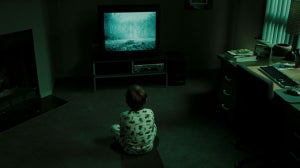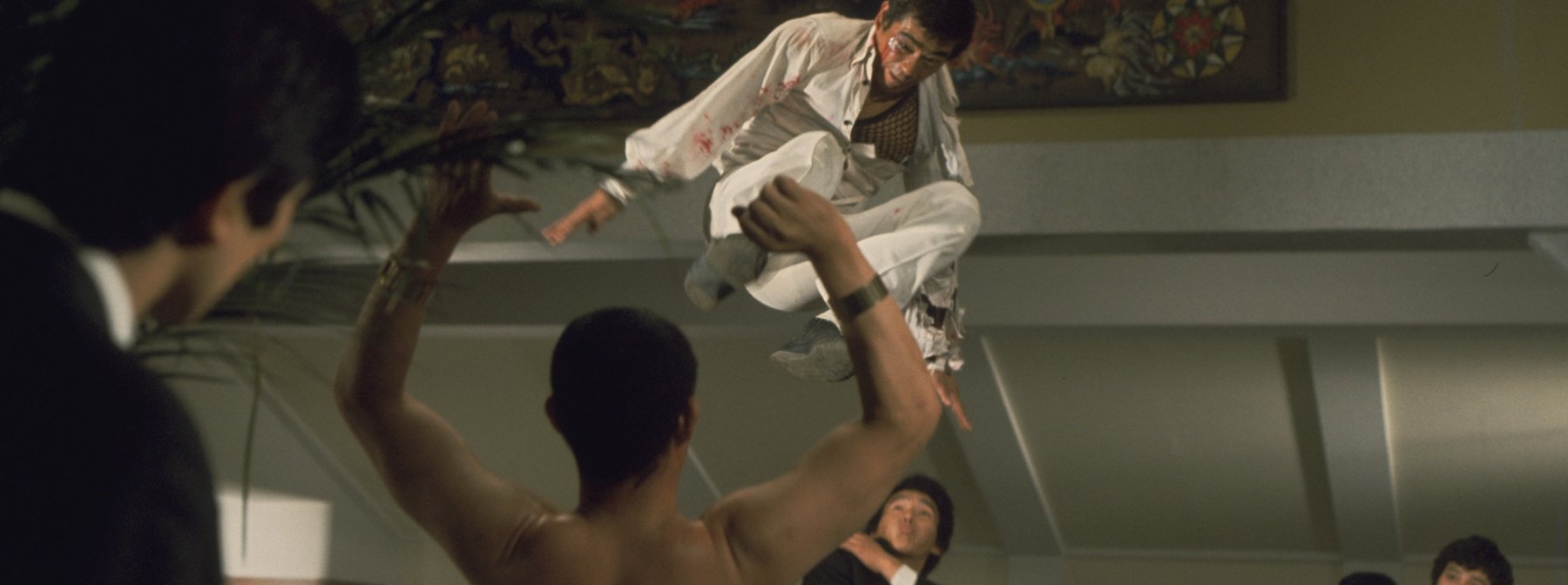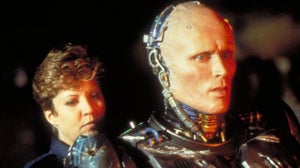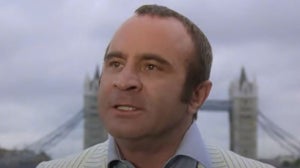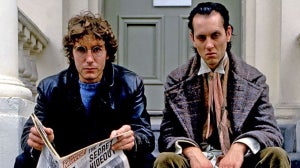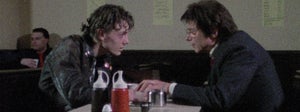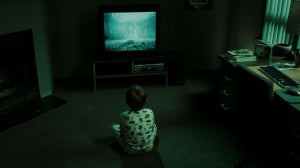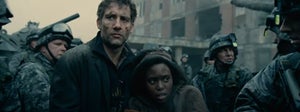
Widely considered one of the finest martial arts actors ever to grace the screen, the late Shinichi (Sonny) Chiba has left an indelible cinematic legacy. Initially trained as a gymnast until injuries turned him onto acting, Chiba was picked up by Toei studios in 1959 and rose through the ranks during the 1960s to become one of the studio’s most exciting leading men.
With Shigehiro Ozawa’s The Street Fighter (1974), Chiba became a global star, the film being the first in the USA to receive an X-rating because of violent content alone. While his role in this international hit is what Chiba is arguably best remembered for, the charismatic action man took on several other iconic characters throughout his prolific career.
The Executioner and Karate Inferno (Teruo Ishii, 1974)
When people first think of Sonny Chiba, brutal ass-kicking tends to come to mind. Savage beatdowns can be found in spades in Teruo Ishii’s The Executioner and its sequel, Karate Inferno, both released in 1974. Chiba plays the ninja turned thief, Ryuichi Koga, and each movie sees him join forces with the distinct faces of Makoto Satô and Eiji Gô, the trio making an unlikely team. Action-comedies at heart, the Executioner films feature tongue-in-cheek performances from Chiba, what with Koga’s schoolboy-like humour and occasionally baffling ninja abilities.
Both films see Chiba in fine martial arts form, the first featuring a wonderful sequence in which a tuxedo-wearing Koga swiftly dispatches several mafia thugs. Amongst Chiba’s co-stars, keen-eyed viewers will notice a fresh-faced Hiroyuki Sanada (Ring), who appears briefly as a young Koga in the first film. Sanada was a product of Chiba’s Japan Action Club, a talent agency and martial arts school established in 1970 to produce capable actors and stuntmen.
While it isn’t a focal point of the Executioner films, the role of a ninja would remain important to Chiba for years to come; the actor once said, “I honestly believe that the root of the Bushido spirit lies in the spirit of the ninjas.”[i] Domestically, the actor experienced success with the TV show Shadow Warriors (1980-85), in which he played various descendants of the Sengoku era ninja Hattori Hanzō – Quentin Tarantino recycled the name for Chiba’s role in Kill Bill. Vol 1 (2003).
https://www.youtube.com/watch?v=zYUzC-XE8q4
Doberman Cop (Kinji Fukasaku, 1977)
Chiba worked with many acclaimed directors over the years but enjoyed his most fruitful relationship with the late Kinji Fukasaku. Together, the pair made eighteen films, including the director’s feature debut, Drifting Detective: Tragedy in the Red Valley (1961). Chiba dabbled in both sides of the law in the director’s numerous crime flicks, one of his most memorable characters being the hard-as-nails Joji Kano in Doberman Cop.
Armed with a .44 Magnum and a pig, Kano kicks ass and performs daring heroics, all against the backdrop of a seedy yakuza underworld. The so-called Doberman cop is a man of few words, so the intensity of Chiba’s performance comes mostly through actions. Gunplay and martial arts go hand-in-hand as Kano blasts and punches his way out of some pretty dire situations, delivering brutal justice along the way.
Chiba maintained a great amount of respect for Fukasaku throughout his career, considering the director to be one of the finest Japanese filmmakers of all time. When speaking on Fukasaku’s philosophy, he recalls the director’s belief that “an actor’s body is his voice.”[ii] Given Chiba’s physical abilities, along with his insistence on performing his own stunts, it’s no wonder that the two collaborated so well and so frequently.
https://youtu.be/k57ZfKHsOXk
Samurai Reincarnation (Kinji Fukasaku, 1981)
Chiba and Fukasaku would work together again on the director’s jidaigeki piece, Shogun’s Samurai (1978). Chiba steps into the shoes of the legendary samurai Jubei Yagyu, his performance earning him his only nomination for the Japanese Academy Awards. Three years later, the actor would embody the one-eyed swordsman again in Fukasaku’s Samurai Reincarnation, this time facing off against the resurrected Christian rebel Shiro Amakusa – played by an unrecognisable Kenji Sawada (Hiruko the Goblin).
It may seem a cheap comparison, but through Jubei, Chiba channels the samurai performances of Toshiro Mifune, what with his grizzled demeanour, stern brow, and commanding presence. Fukasaku delivers several truly cinematic sequences, including a tense beachside duel between Chiba and the wonderful Ken Otaga, before a fiery finale. Chiba has referred to the project as one of his favourites, speaking of the challenges posed by working on a burning set, not to mention performing swordplay while wearing an eye patch![iii]
Jubei Yugya has become one of Chiba’s most iconic roles, his performances not solely restricted to Fukasaku’s films. The actor would play the greatly romanticised samurai in several TV shows until his final outing in 2005, including the televised adaption of Shogun’s Samurai, The Yagyu Clan Conspiracy (1978-79). There was even talk of Chiba’s Jubei appearing in a Hollywood remake of The Magnificent Seven (1960), although this never came to be.
https://youtu.be/sr3zUlwP7Pk
The Storm Riders (Andrew Lau, 1998)
As well as being a domestic star, Chiba was a draw for international audiences, at one point poised for a starring role alongside Bruce Lee until the martial arts legend’s untimely passing. Prior to his Hollywood outing with Tarantino, Chiba starred in the Hong Kong-produced wuxia flick, The Storm Riders (1998). Directed by Andrew Lau, who would later helm the acclaimed Infernal Affairs trilogy, the film is a bonkers fantasy and special effects extravaganza.
When speaking about The Street Fighter, Chiba once said, “for me, the most enjoyable role to play is the bad guy.”[iv] Unsurprisingly then, he revels in the role of the malevolent Lord Conqueror. His bombastic performance is easily the most enjoyable aspect of the film, the actor utilising his naturally expressive face and physical theatrics to steal every scene. Chiba’s enthusiasm earned him a best actor nomination at the Hong Kong Film Awards, marking further overseas acclaim.
There’s a myriad of reasons why The Storm Riders is worth watching in and of itself, not in the least the atrociously dated CGI that is somehow charming in how poorly it’s aged. Behind-the-scenes footage of Chiba dangling from wires in front of a blue screen is an odd sight given his daring practical stunts of yesteryear. However, to be nearly sixty-years-old at the time of filming and still so heavily involved in the stunt work is a testament to his passion and dedication.
https://youtu.be/aYhIcaTSpB0
With over 200 screen credits to his name, Sonny Chiba has left behind a staggering number of high-octane action films. But perhaps more importantly, the late actor leaves the impression of a masterful performer committed to perfecting all aspects of his craft.
Arigatō Chiba-san.
[i] Sengoku 戦国時代 Jidai, (2022), Sonny Chiba interview (影の軍団) Kage no Gundan, [online video], Available at: <https://youtu.be/gHbzYhbfzSk>
[ii] Sengoku 戦国時代 Jidai, (2022)
[iii] Yuan-Kwan Chan, (2017), A Sonny Chiba interview: Acting, martial arts and family, Meniscus, <https://www.meniscuszine.com/articles/2014080331375/a-sonny-chiba-interview-acting-martial-arts-and-family/>
[iv] Mondaygirl, (2007), Sonny Chiba, [online video], Available at: <https://youtu.be/Xev3_XjCK2M>

Related Articles
